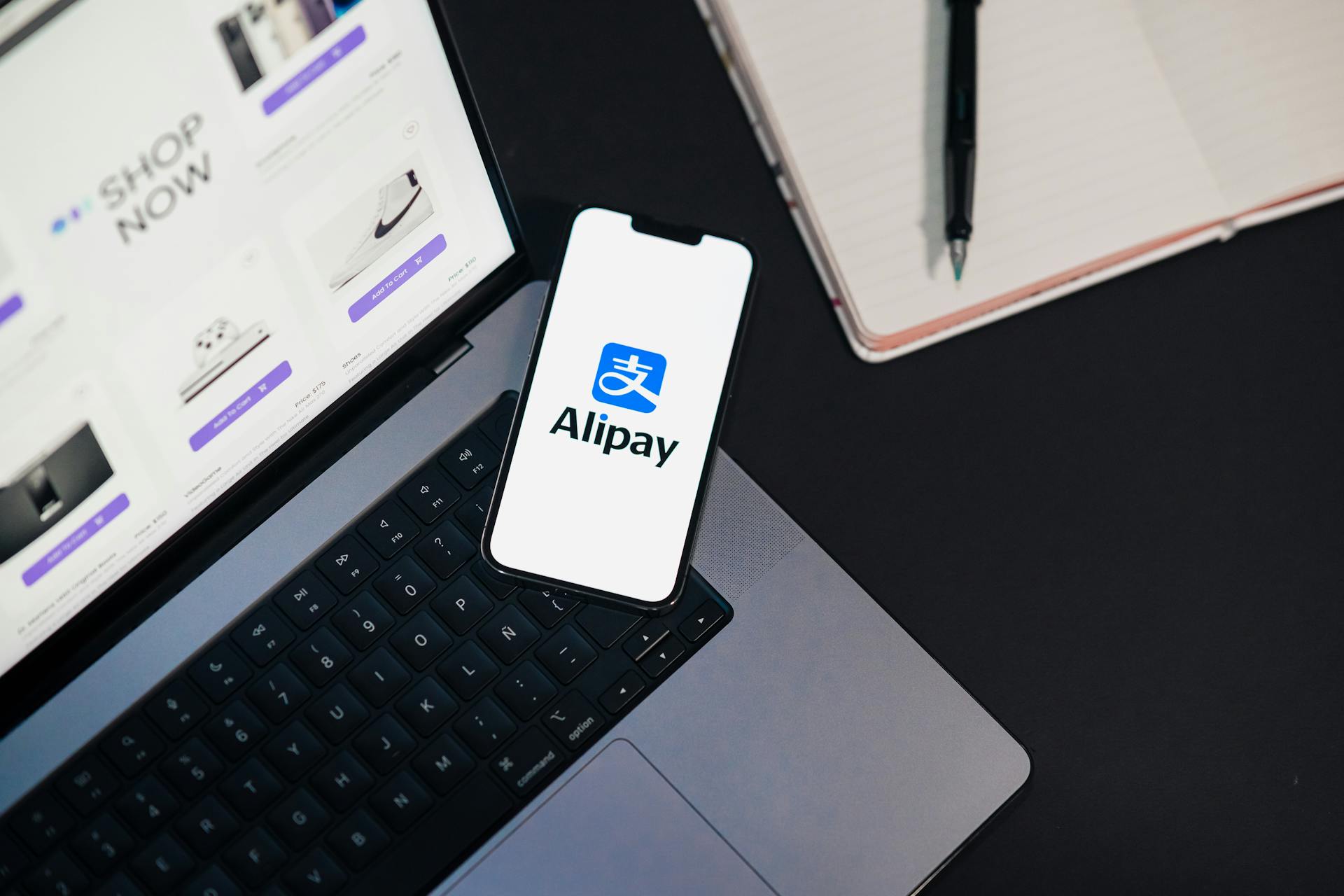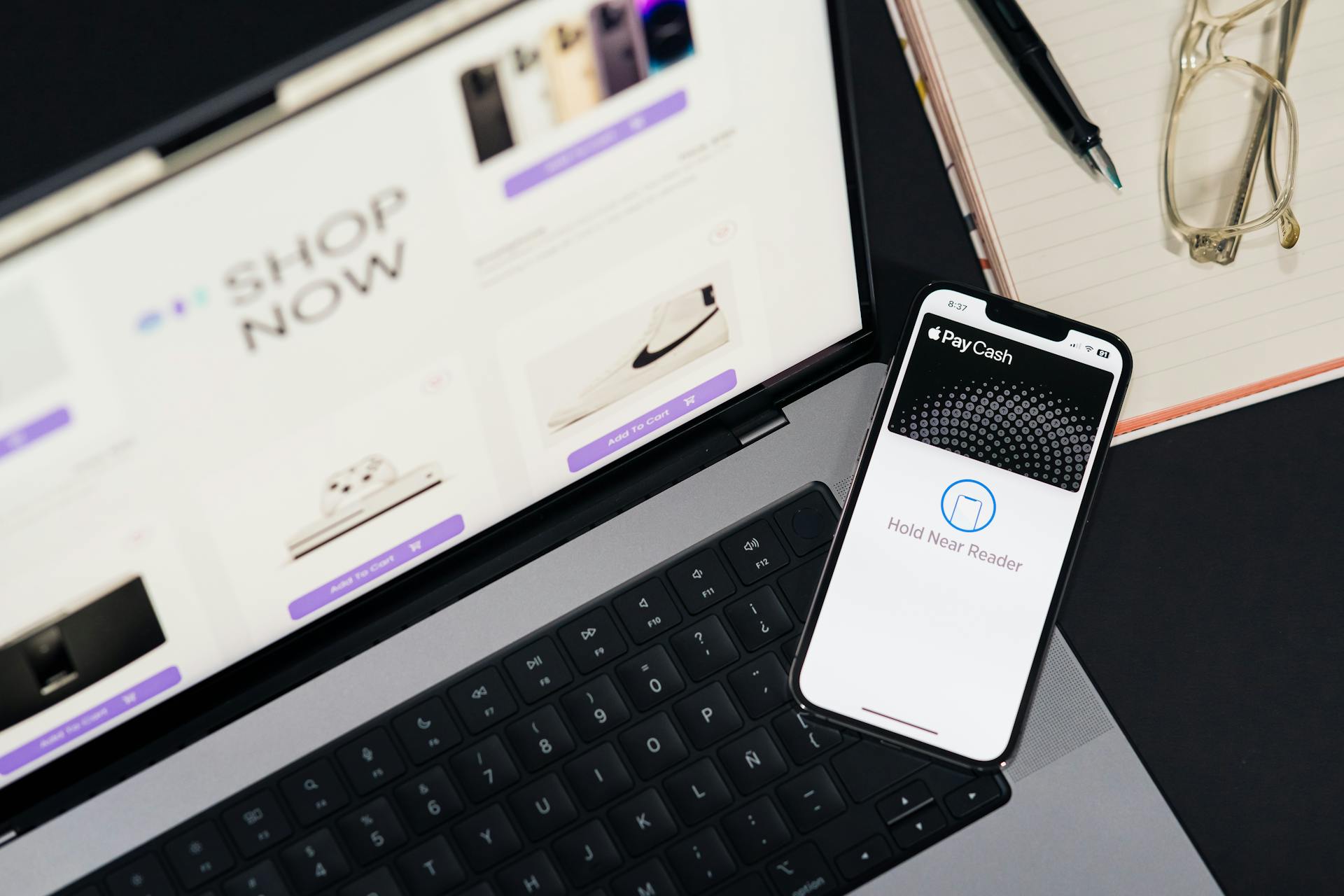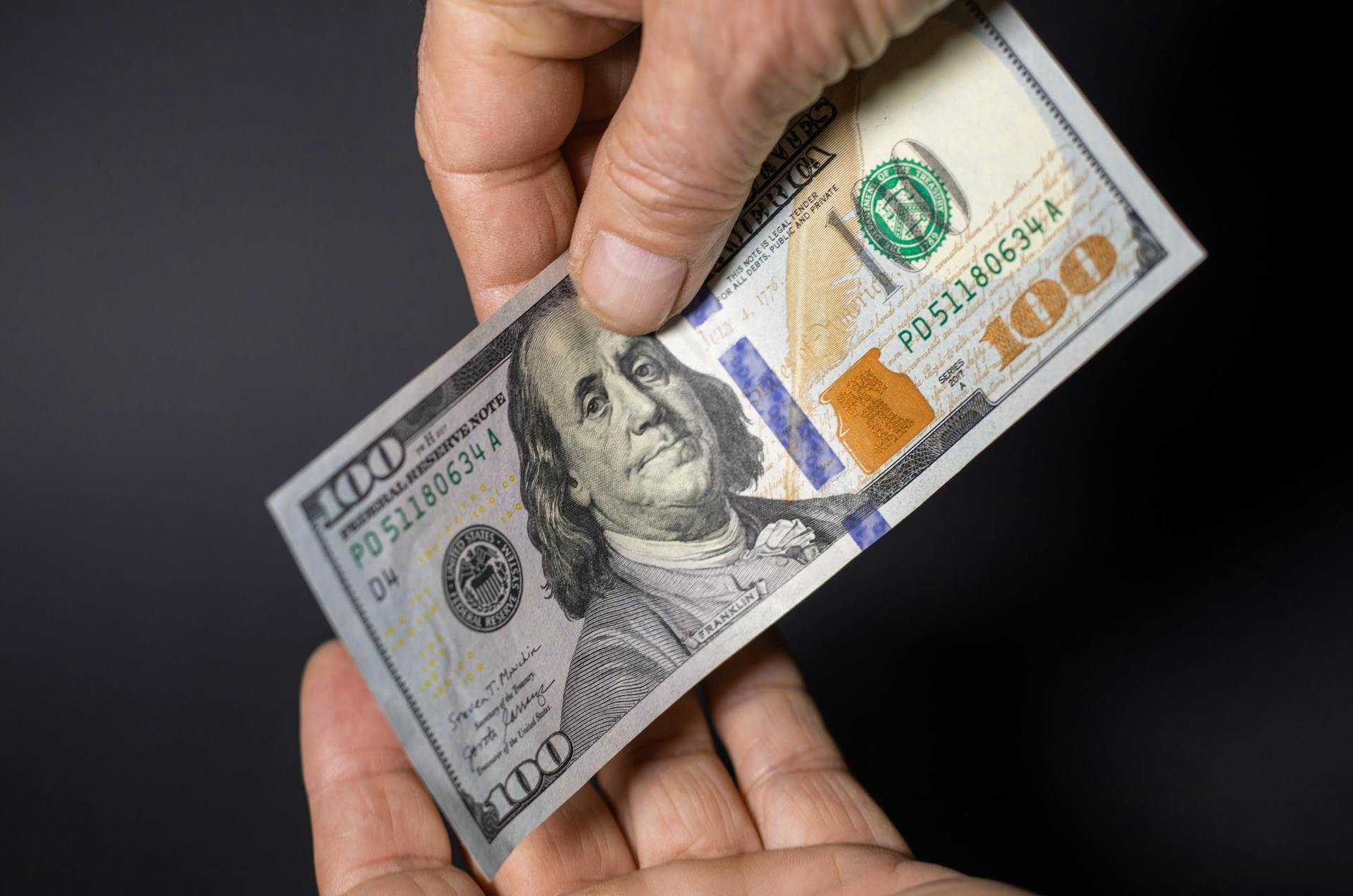
Alipay is a digital wallet service that has become incredibly popular in China, with over 1 billion users worldwide. It's a subsidiary of Ant Financial, a fintech company that's part of the Alibaba Group.
Alipay allows users to link their credit or debit cards, as well as bank accounts, to make payments online or in-store. This service is integrated into various apps and websites, making it a convenient option for consumers.
The digital wallet market has grown rapidly in recent years, with Alipay being one of the leading players. It offers a range of services, including mobile payments, online banking, and wealth management.
Expand your knowledge: Alipay Blockchain Payments
History of Alipay
Alipay was first launched in 2003 by Taobao. The service quickly gained popularity and became a major player in China's online payment market.
In 2010, the People's Bank of China issued licensing regulations for third-party payment providers, which led to Alipay being restructured as a domestic company controlled by Alibaba CEO Jack Ma.
On a similar theme: What Is Square Payment System
Alipay's ownership transfer in 2010 was a bit of a controversy, with media reports suggesting that Yahoo! and Softbank were not informed of the sale for nominal value. However, the incident was eventually resolved by Alibaba Group, Yahoo!, and Softbank in July 2011.
Alipay launched its financial product platform, Yu'e Bao, in 2013, which offered an online money market account with a higher interest rate than traditional banks. This platform became incredibly popular, with 152 million users and 810 billion RMB (US$117 billion) in funds under management by mid-2016.
In 2015, Alipay's parent company was re-branded as Ant Financial Services Group. Alipay continued to innovate, unveiling its facial recognition payment service in 2017.
Alipay's transformation from a payment financial instrument to an open platform for digital life was completed in 2020. This marked a significant shift for the company, allowing users to access a wide range of services beyond just payment.
The Chinese government's regulatory environment has played a significant role in Alipay's development. In 2010, the People's Bank of China issued administrative measures regarding non-financial payment services, which retroactively recognized the legal status of online third-party payment platforms like Alipay.
Intriguing read: Bank Payment Solution
Services
Alipay operates with more than 65 financial institutions, including Visa and MasterCard, to provide payment services for Taobao and Tmall, as well as over 460,000 online and local Chinese businesses.
The Alipay app allows users to make payments using QR code payment codes for local in-store payments.
Alipay provides features such as credit card bill payments, bank account management, P2P transfer, prepay mobile phone top-up, bus and train ticket purchases, food orders, vehicles for hire, insurance selections, and digital identification document storage.
With the Alipay app, users can also pay utility bills, transportation fines, property fees, and cable television fees, covering over 300 cities nationwide and supporting over 1,200 partner organizations.
Alipay's credit card repayment service, launched in 2009, supports 39 domestic bank-issued credit cards and is currently the most popular third-party repayment platform.
The service offers benefits such as free credit card bill checking, repayments with no administrative fee, automatic repayment, repayment reminders, and other value-added services.
Broaden your view: Brics Pay App
By 2014, 76% of credit cards were paid through Alipay Wallet, making it a convenient and widely-used option.
In 2019, Alipay introduced a service fee for credit card payments exceeding 2,000 yuan, charged at 0.1% of the excess amount.
With Tourpass, introduced in 2019, non-Chinese users can use Alipay's mobile payment feature by pre-loading Chinese Yuan equivalent foreign currency into the app.
During the COVID-19 outbreak, Alipay used a QR code system to help contain the spread by tagging users with a color-coded health code based on their location, basic health information, and travel history.
Alipay Expansion
More than 300 worldwide merchants use Alipay to sell directly to consumers in China.
Alipay supports transactions in 18 foreign currencies, making it a convenient option for international commerce.
Ant Financial has expanded Alipay's services to other countries, integrating it with online payment platform providers.
Foreign Expansion
Alipay's foreign expansion has been a significant aspect of its growth. Over 300 worldwide merchants use Alipay to sell directly to consumers in China.
Alipay supports transactions in 18 foreign currencies, making it a convenient option for international businesses.
Ant Financial introduced a series of expansion services to other countries after launching Alipay in Mainland China.
Alipay's system is integrated with online payment platform providers, allowing for seamless transactions.
In April 2022, Ant Group acquired a majority stake in 2C2P, a Singapore-based provider used by merchants worldwide.
Ant Group plans to eventually integrate Alipay with 2C2P, further expanding its reach.
Hong Kong
In 2017, Ant Financial expanded to Hong Kong, launching the "AlipayHK" brand in a joint venture with CK Hutchison.
AlipayHK is a standalone app that provides features such as mobile payments and P2P transfers, with all transactions made and settled in local Hong Kong dollars.
The service was initially available in major chain stores like McDonald's, 7-Eleven, and Circle K, as well as in wet markets and other merchants.
By 2020 and 2021, AlipayHK had gained two million users and became accepted on MTR, buses, and ferries.
This widespread adoption made it a convenient option for locals and tourists alike, allowing them to make transactions easily and efficiently.
Risk Monitoring:
Risk monitoring is a crucial aspect of Alipay's security features. Alipay checks for any unusual activity with your account, which they call risk monitoring.
This involves analyzing real-time big data in your account, including your usage behavior. Alipay uses machine learning algorithms to learn your usage patterns and flag any suspicious activity for review.
If Alipay detects something that doesn't match your behavior, you'll receive a notification. This proactive approach helps protect your account from potential threats.
Here are some key aspects of Alipay's risk monitoring system:
- Risk monitoring reviews data to detect a user's risk level and review all payments.
- Alipay uses machine learning algorithms to learn your usage behavior and flag suspicious activity.
- You'll receive a notification if Alipay detects something that doesn't match your behavior.
Alipay's risk monitoring system is designed to be proactive, helping to prevent potential threats and keep your account safe.
Alipay Benefits and Partnerships
Alipay offers a range of benefits that make it a popular choice for mobile payments. It's safe to use, as you don't need to carry around bank cards or large amounts of cash. With Alipay, you can also make fast and convenient payments online or in-store.
For another approach, see: Facebook Payments Inc Paypal
Alipay is widely recognised and accepted in China, making it a great option for tourists and locals alike. It's secure too, requiring a PIN to authorise every transaction. If you have a smartphone with a touch ID feature, you can even use your fingerprint to authorise transactions.
Alipay's partnership with WorldRemit makes it easy to receive remittances quickly, with money transferred directly into your Alipay e-wallet in a matter of minutes. This is especially useful for Chinese nationals living abroad who need to send money to their family back home.
Discover more: Atm Mobile Money
Benefits of Using
Using Alipay is incredibly safe, as there's no need to carry around bank cards or large amounts of cash.
You can make payments online with just your PIN, and you only need to fill in your personal information and card details once.
Alipay is widely recognized, with a market share of around 54% in China, making it one of the most popular e-wallet services.
The app is also super convenient, allowing you to top up your mobile airtime, order and pay for a taxi or takeaway, and even receive remittances quickly through its partnership with WorldRemit.
Alipay payments are cashless, reducing the chance of getting robbed with a sizable amount of cash, and the app itself is password-protected.
Here are some of the benefits of using Alipay:
- Safe:
- Fast payments:
- Widely recognized:
- Secure:
- Comprehensive:
- Receive remittances quickly:
With Alipay, you can make payments in just a few seconds using your PIN and biometric verifications, or with your password and verification codes.
The Alipay app provides a wide range of services, from in-store and mobile app availability to booking a cab and getting a credit card, making it a super convenient and easy-to-use platform.
Readers also liked: Alipay Mobile App
WorldRemit's Partnership
WorldRemit partnered with Alipay to make it easier for Chinese nationals living abroad to transfer money to their families back home.
This partnership allows users to transfer money directly into their Alipay account, which should be received in a matter of minutes if the receiver has set up their account to receive remittances.
WorldRemit users can use their account to send money to China, making it a convenient option for those who need to send money to loved ones.
Alipay Features and Technology
Alipay allows users to make payments with just a scan of their phone, using a technology called QR code scanning.
This feature is quick and convenient, making it easy to pay for everyday items like coffee and groceries.
Alipay also offers a feature called Alipay Wallet, which allows users to store their credit or debit card information securely.
Users can then make payments using just their phone, without the need for physical cards.
Alipay's technology also includes a feature called Mobile Payment, which enables users to make payments at over 40 million merchants worldwide.
Shopper Journey - Mobile
Using Alipay on a mobile device can be a seamless experience, especially if you have the app installed. The process is straightforward and efficient, with a confirmation screen appearing after selecting Alipay on the mobile payment page.
If you have the Alipay app installed, it will automatically open when you select it on the mobile payment page. This saves you time and effort, making the payment process even quicker.
Worth a look: Electronic Billing & Payment Solutions
A confirmation screen with the amount to pay appears, allowing you to review the transaction before completing it. This is an essential step in the payment process, ensuring that you're aware of the amount being deducted from your account.
If the payment is successful, you'll see a confirmation message on the mobile payment page, indicating that the transaction has been completed.
In some cases, you may need to enter your phone number or email address to receive a One-Time PIN by text message. This is an optional Alipay risk check to ensure the security of the transaction.
If you do need to enter your phone number or email address, you'll then receive the One-Time PIN by text message. This PIN is used to confirm your identity and complete the payment process.
To confirm the payment, you'll need to enter the One-Time PIN on the app. This is a crucial step in the payment process, ensuring that the transaction is secure and legitimate.
After confirming the PIN, you'll need to enter your payment password to complete the transaction. This is another essential step in the payment process, ensuring that only authorized users can make payments using your account.
The payment is then confirmed successful, and you'll see a confirmation message on the mobile payment page. This indicates that the transaction has been completed, and the funds have been deducted from your account.
Here's a summary of the mobile shopper journey:
Shopper Journey 2 - Desktop and Shopper Logs
The shopper's journey continues on a desktop device, where they log in to Alipay to confirm the payment. This is a crucial step in the payment process.
The shopper selects Alipay on the desktop payment page, choosing the pay-on-screen option and signing in. This is where the shopper authenticates their identity.
The shopper then selects their funding method, choosing from Alipay wallet funds, linked card, or other options. This is where the shopper decides how they want to pay.
To complete the payment, the shopper enters their payment password. This is a secure step that ensures the shopper's identity and payment information are protected.
Once the payment is confirmed, the shopper sees a successful payment confirmation on the Alipay desktop page. This is a reassuring sign that the payment has been processed correctly.
On a similar theme: Global Pay Mpesa
Biometric Verification:
Alipay has a two-factor biometric verification process to make payments secure. This process requires not only a password, but also a biometric scan to complete transactions.
You can use your fingerprints or face ID for biometric verification. This adds an extra layer of security to prevent unauthorized access to your account.
Alipay's Liveness Detection feature ensures that it's really you making the payment, and not just a photo of you. This feature detects whether the biometric scan is from a live person or a still photo.
Frequently Asked Questions
Does Alipay work in the USA?
Yes, Alipay works in the USA, but only at select merchants catering to Chinese tourists or with a large Chinese customer base. You can use it by scanning a QR code to complete a transaction.
Is Alipay the same as PayPal?
Alipay is China's equivalent to PayPal, offering e-wallet services for mobile payments. While similar, Alipay serves a distinct market and user base.
Is it safe to pay through Alipay?
Alipay offers robust security measures to prevent fraud and scams, making it a secure option for mobile payments
Featured Images: pexels.com

